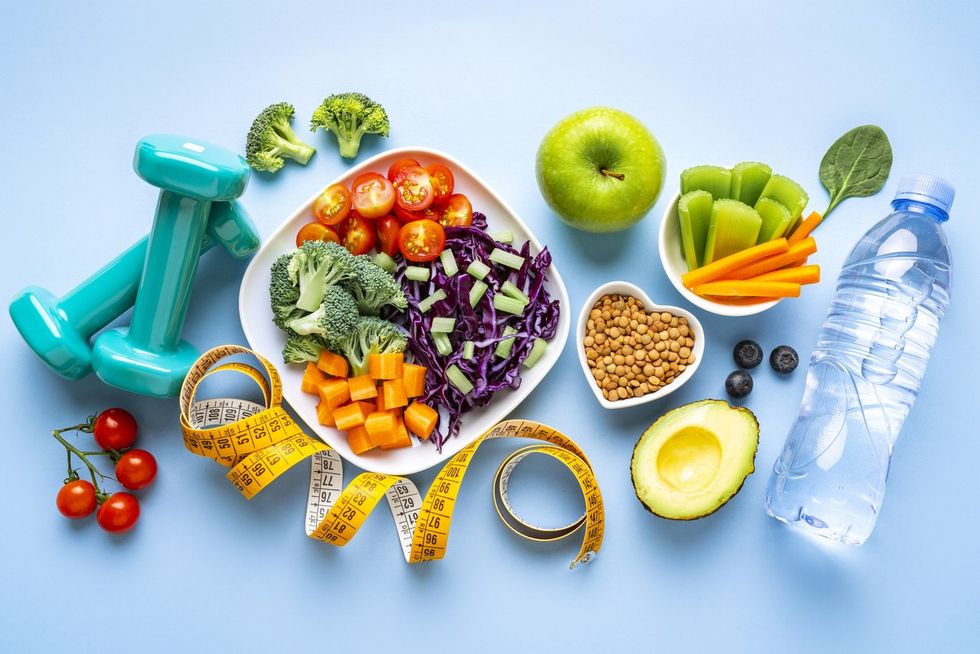PHYSICAL exercise is important when it comes to fitness, but what we fuel our body with plays an equally vital role in achieving sustainable results.
The key to long-term fitness success is developing mindful eating habits that nourish the body and soul, enhance performance and help maintain a healthy lifestyle. This does not necessarily mean following a restrictive diet or complicated meal plans. It is about finding a sustainable balance that works for you.
While more people are embracing healthy eating habits, busy lives often get in the way, and managing time becomes a major hurdle. With that in mind, here is a guide to creating quick and easy mindful eating habits, incorporating meal prep and planning, the 80-20 rule, and the balanced plates concept.
Meal planning
A great way to stick to nutrition goals is by dedicating a few hours each week to meal planning. Keep it simple and mix up the flavours. Choose a few healthy, versatile recipes. Focus on dishes that can be made in bulk, such as roasts, salads, stir-fries, soups, or grain bowls, and include a choice of protein for each meal. Always aim for a well-balanced plate with protein, vegetables, whole grains, and healthy fats.
Here are some top tips:
■ Use a weekly planner or journal to cover all your meals, including snacks. (Snacks are where we end up consuming empty calories.)
■ Choose recipes that share ingredients to reduce waste. It also helps saves time as you prep for multiple meals in one go.
■ Plan meals that are easy to store and reheat.
Shopping
Once your meals are planned, create a shopping list. This will help avoid impulse buys and ensure you have everything you need for the week. Stick to the list to minimise food waste and save money. Organise it by categories (fresh produce, proteins, grains) to make shopping quicker and easier.
Meal prepping
Meal prepping saves time, helps you eat healthier, and reduces stress during a busy week. Preparing meals in advance means you will always have nutritious, homemade food on hand, without the temptation of fast food or processed meals. It’s easier to stay on track with healthy, ready-to-go meals.
Helpful tips:
■ Wash, chop, and prepare ingredients before you start cooking. This makes the process faster and less overwhelming. You can prep vegetables, marinate proteins, and even cook grains like rice or quinoa ahead of time.
■ Roast or steam vegetables in large batches. Cook enough grains or pasta for several meals. Batch cook gravies, sauces, or bases for your proteins, pasta, or vegetables. Cut fruits and vegetables for snacks or salads.
Batch cooking
Batch cooking is at the heart of meal prepping. Make large quantities of food that can be portioned out for the week. Casseroles, bakes, roasts, soups, stews, and one-pot meals are all great options that reheat well.
If you prefer not to cook large pots, prepare individual components like grilled chicken, salmon, rice, mashed potatoes, and roasted vegetables. Use simple seasonings to adjust the flavours as needed.
Storage
Proper storage is key to keeping meals fresh. Invest in good-quality containers that are microwave-safe and freezer-friendly. Glass containers are a great option.
■ Store meals in individual portions so they are easy to grab and go. This helps with portion control and keeping track of macros.
■ Place the most perishable meals at the front of the fridge to eat first.
■ Freeze meals such as soups or casseroles that may not last the entire week.
Reheating
When it is time to eat, simply reheat your prepped meals in the microwave or on the stove.
Remember the saying: ‘we eat with our eyes first’. Present your food thoughtfully so it looks appetising and triggers positive emotions, making you enjoy your meals even more.
Add colour to your plate and eat the rainbow. For example, a simple oats bowl can be topped with colourful berries and fruits.
Reheating tips:
■ Reheat grains and proteins separately to avoid overcooking.
■ Store sauces and dressings separately and add them just before eating to keep meals fresh.
The 80-20 rule
An effective way to maintain a healthy diet is by following the 80-20 rule. This means 80 per cent of your food should be nutritious and fuel your body, while the remaining 20 per cent can include small indulgences.
This rule allows a healthy lifestyle, without feeling deprived. In practice, it means focusing on whole foods most of the time – lean proteins, fresh vegetables, fruits, and whole grains. At the same time, allow yourself flexibility. A slice of pizza or a piece of chocolate can fit into your nutrition plan as long as it stays within the 20 per cent. The key is moderation and making the most out of your 80 per cent.
Why the 80-20 rule works:
■ Sustainable: It prevents feelings of restriction that can lead to overeating.
■ Flexible: It lets you enjoy life’s pleasures without guilt.
■ Balanced: It encourages a healthy relationship with food while still prioritising nutrition.
Sustainable eating habits are not about perfection; they are about balance. Incorporating meal prep and planning, embracing the 80-20 rule, and focusing on balanced plates filled with nutrient-dense foods can set you up for long-term success.
Small, sustainable changes to your eating habits are not only a good way to stay fit but also make the journey enjoyable.
So, grab your meal prep containers, plan your week, and remember – consistency is key.
(Nesreen G and Jayeeta Dutta believe in creating sustainable ways of maintaining a healthy lifestyle and are here to share their experiences and top tips. They do not just chase goals – they crush them. Instagram: @flexandfuel_official)





